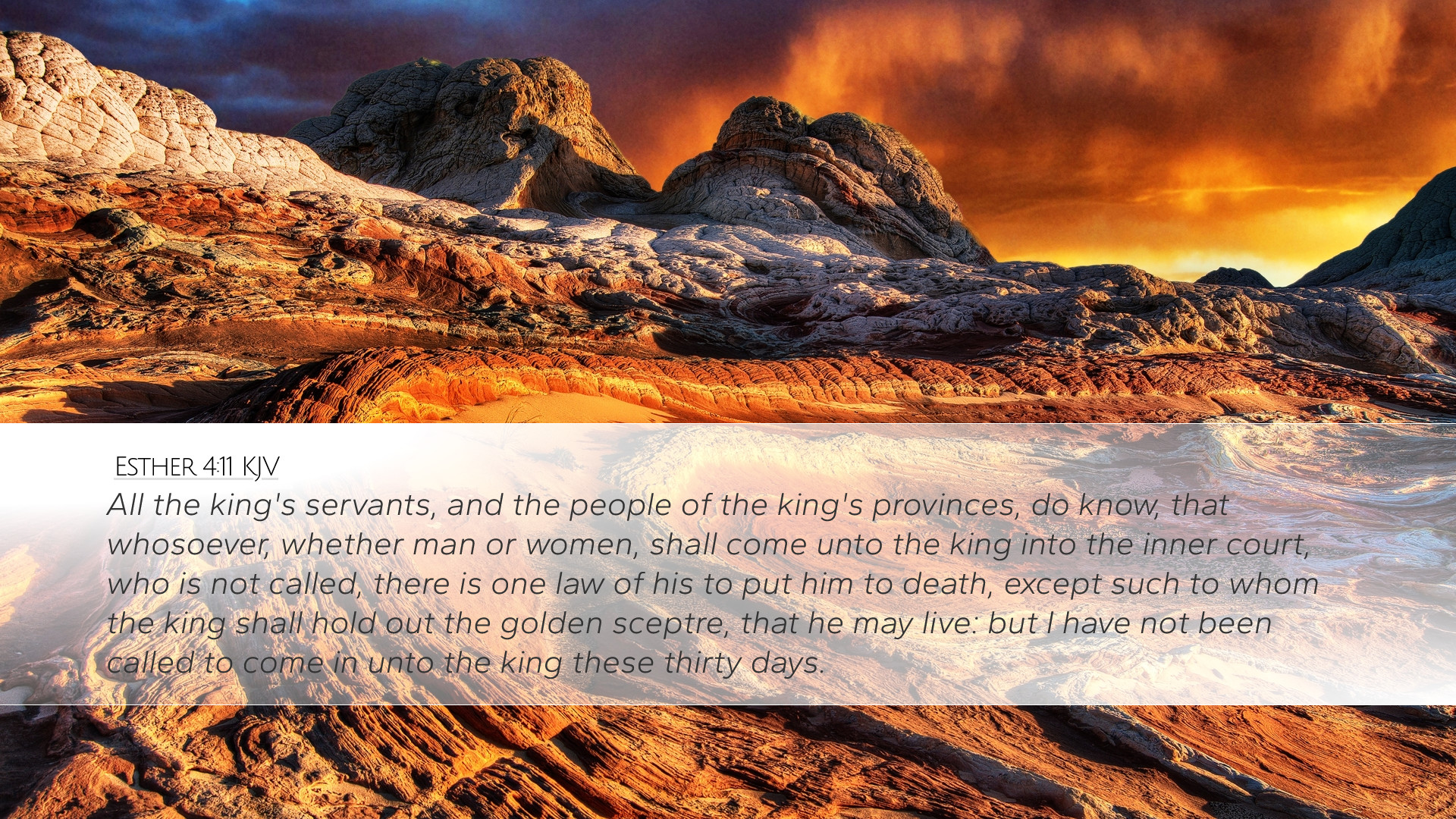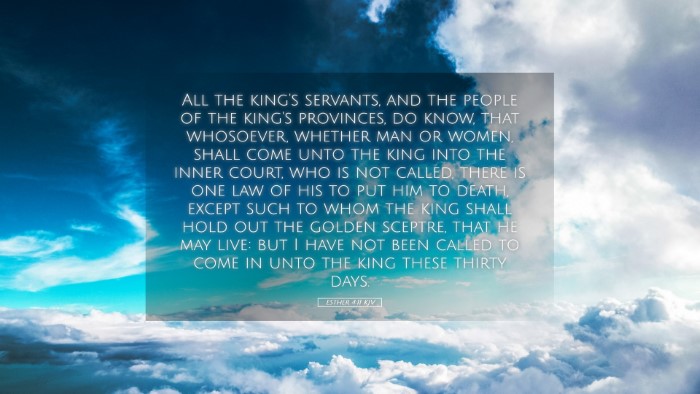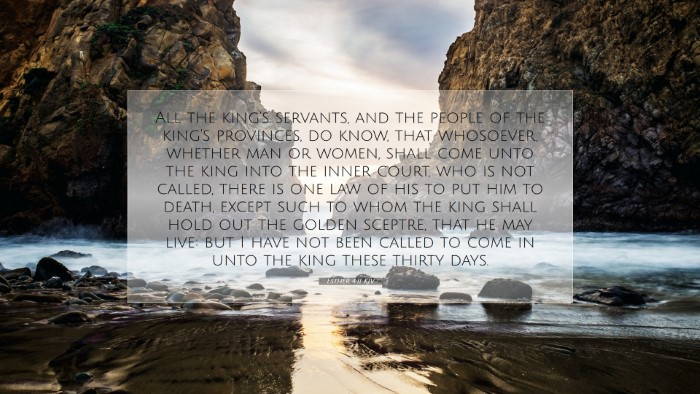Old Testament
Genesis Exodus Leviticus Numbers Deuteronomy Joshua Judges Ruth 1 Samuel 2 Samuel 1 Kings 2 Kings 1 Chronicles 2 Chronicles Ezra Nehemiah Esther Job Psalms Proverbs Ecclesiastes Song of Solomon Isaiah Jeremiah Lamentations Ezekiel Daniel Hosea Joel Amos Obadiah Jonah Micah Nahum Habakkuk Zephaniah Haggai Zechariah MalachiEsther 4:11
Esther 4:11 KJV
All the king's servants, and the people of the king's provinces, do know, that whosoever, whether man or women, shall come unto the king into the inner court, who is not called, there is one law of his to put him to death, except such to whom the king shall hold out the golden sceptre, that he may live: but I have not been called to come in unto the king these thirty days.
Esther 4:11 Bible Commentary
Commentary on Esther 4:11
Bible Verse: Esther 4:11 - "All the king's servants, and the people of the king's provinces, do know, that whosoever, whether man or woman, shall come unto the king into the inner court, who is not called, there is one law of his to put him to death, except such to whom the king shall hold out the golden scepter, that he may live: but I have not been called to come in unto the king these thirty days."
Contextual Overview
The Book of Esther presents a unique narrative in the scripture, characterized by its focus on divine providence throughout the story of the Jewish people's deliverance from extermination. Esther, a Jewish orphan raised by her cousin Mordecai, is now queen of Persia but faces a dire situation when a plot to annihilate her people is brought to light. This particular verse reveals the tension and fear surrounding Esther's potential approach to King Ahasuerus.
Analysis of Esther 4:11
Danger of Approaching the King
This passage articulates the perilous nature of entering the king's presence without invitation, which reflects the seriousness of royal protocol in ancient Persia. As Albert Barnes suggests, the expectation of the monarch's recognition, demonstrated by extending the golden scepter, signifies both authority and mercy. It compels us to respect the gravity of Esther's situation; her hesitation is understandable amidst the absolute power wielded by the king.
Implications of Royal Decree
Matthew Henry elaborates on the implications of the king's decree, emphasizing that this law was not merely arbitrary but indicative of the importance of maintaining power and control within the royal court. The principle outlined in this verse serves as a poignant reminder about the socioeconomic dynamics and cultural tenets in which Esther operates, as well as the limitations placed upon individuals, especially those in less authoritative positions.
The Role of the Golden Scepter
The golden scepter, as described in the verse, serves as a pivotal symbol of the king's favor and authority. As noted by Adam Clarke, the scepter’s significance represents not only survival but also acceptance and grace. This moment highlights the intersection of fear and hope as Esther grapples with her mission while being acutely aware of the risks involved.
Esther's Position and Her Challenges
Esther's predicament illustrates a profound internal conflict; her identity as a Jew stands in stark contrast to her role as queen. The historical circumstances offer a parallel to the overarching themes of faith and courage in dire times. Mordecai's earlier exhortation to Esther—to consider her position within the palace as potentially pivotal for her people—further adds weight to her decision-making process.
Call for Action
Matthew Henry poignantly reminds us that at moments of crisis, we must assess our motivations and determine if we are prepared to act in obedience to God's call despite personal peril. Esther's silence for thirty days, as she remarks, indicates her struggle between facilitating her people's salvation and maintaining her safety in a precarious position.
Theological Reflections
This verse opens up avenues for theological exploration into the nature of divine providence, human agency, and the social conditions that shape our actions. The tension portrayed in Esther’s response invites reflection on how believers today might navigate similar lines between faith and pragmatism.
The Sovereignty of God
Albert Barnes posits that while the apparent political order and laws of the land seem to govern earthly affairs, God’s sovereignty operates behind the scenes. Esther's very presence in the royal court is evidence of God's providential hand working to position individuals for significant tasks within His divine narrative.
Faith and Fear
The duality of fear and faith is palpable in this verse. Adam Clarke captures this tension well, emphasizing that while fear is a natural response to danger, it should not paralyze our actions in obedience to God’s greater calling. The faithful believer must learn to navigate fear by anchoring themselves in trust in God’s plans and purposes.
Application for Today’s Believers
- Understanding Risk: Contemporary Christians may find themselves in situations where taking a stand for truth may involve personal risks akin to Esther’s. Recognizing the gravity of such decisions can lead to profound moments of faith-based courage.
- Cultural Sensitivity: Engaging with challenging cultural dynamics while maintaining one’s identity in Christ mirrors Esther’s struggle. Her journey encourages modern believers to evaluate their contexts thoughtfully.
- Divine Placement: Esther's status places her at a juncture where her actions could lead to significant outcomes. This speaks to the concept of being divinely placed in situations for specific purposes, encouraging believers to see their circumstances as opportunities for God's work.
Conclusion
Esther 4:11 offers rich insights into the complexities of leadership, risk, and faith within the realm of divine providence. As we reflect on this verse, we are reminded that our fears can catalyze growth and faith when we seek to trust God above the trials we face. The tension surrounding Esther's dilemma serves as a case study encouraging believers, leaders, and scholars alike to engage deeply with the nuances of faith in the context of a challenging world.


